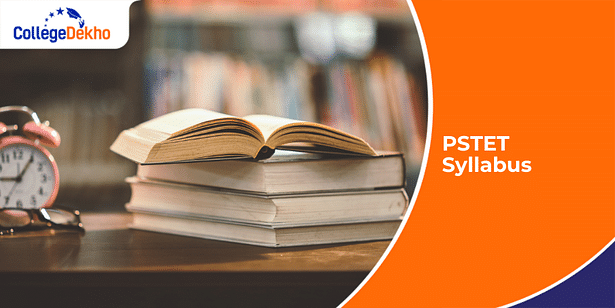
The
PSTET syllabus 2024
comprises two papers: Paper I is designed for candidates interested in teaching Classes I to V, while Paper II is for those aiming to teach Classes VI to VIII. It is crucial for candidates aiming to secure teaching positions in government and aided schools across Punjab to understand the syllabus properly. It serves as a detailed guide for exam preparation, helping aspirants concentrate on key topics that are relevant to the exam. The
Punjab State Teacher Eligibility Test (PSTET) 2024
is a state-level exam held annually to assess the eligibility of candidates aspiring to teach Classes 1 to 8 in schools across Punjab. Understanding the PSTET 2024 syllabus ensures candidates are equipped to handle various question types with confidence and accuracy on exam day. In addition to the PSTET syllabus, reviewing the PSTET 2024 exam pattern is equally important for gaining a complete understanding of the exam's structure and requirements. Candidates can review the sections below to learn the detailed PSTET 2024 syllabus.
Also Read:
PSTET Application Form 2024
PSTET Syllabus 2024 PDF Download
To ensure effective exam preparation, candidates should thoroughly review the subject-wise syllabus before starting. The PSTET Syllabus 2024 PDF is available in the table below:
Subject | PDF Link |
|---|---|
PSTET Syllabus 2024 |
Below, you'll find the detailed PSTET syllabus for both Papers I and II, preparation strategies, and recommended books.
PSTET Syllabus 2024 for Paper 1
The PSTET Paper 1 syllabus for 2024 covers key subjects such as Child Development and Pedagogy, Language I, Language II, Environmental Studies, and Mathematics. Candidates must have a thorough understanding of the concepts within each section to perform well in the exam. Below is a detailed breakdown of the important topics for PSTET Paper 1.
Subject | Important Topics |
|---|---|
Child Development and Pedagogy | 1) Child Development (Primary School Child): Intelligence perspectives, individual differences, gender roles, heredity vs. environment, child-centered education, Piaget, Kohlberg, Vygotsky, and more. 2) Inclusive Education: Addressing children with learning difficulties, diverse learners, specially-abled learners. 3) Learning and Pedagogy: Children as problem solvers, cognition, learning processes, motivation, social context of learning. |
Language-I | 1) Language Comprehension: Reading unseen passages (prose/drama/poetry) with comprehension, inference, grammar questions. 2) Pedagogy of Language Development: Language skills, teaching materials, language acquisition, remedial teaching, principles of language teaching. |
Language-II | 1) Comprehension: Reading unseen passages (prose/literary/scientific) with grammar and comprehension questions. 2) Pedagogy of Language Development: Language acquisition, teaching materials, challenges in teaching, remedial teaching, grammar’s role in communication. |
Mathematics | 1) Numbers, geometry, shapes, division, multiplication, addition/subtraction, patterns, time, volume, data handling. 2)Teaching and learning methods, error analysis, remedial teaching, logical thinking, place of mathematics in curriculum. |
Environmental Studies (EVS) | Studies (EVS)1) Family, water, food, shelter, travel, things we make and do. 2) Pedagogical Issues: Activities, teaching aids, practical work, discussion, concept and scope of EVS, relation to Science & Social Science, integrated EVS approach. |
PSTET Syllabus 2024 for Paper 2
The PSTET Paper 2 syllabus for 2024 includes several important sections such as Child Development and Pedagogy, Language I, Language II, Mathematics and Science, or Social Studies. Candidates must have a clear conceptual understanding of all the topics and select the best preparation materials. Below is a detailed breakdown of the PSTET Paper 2 syllabus for candidates' reference.
Subject | Important Topics |
|---|---|
Child Development and Pedagogy | 1) Child Development (Elementary School Child): Understanding learner diversity (language, caste, gender, religion), principles of child development, heredity and environment, socialization processes, continuous and comprehensive evaluation, intelligence theories, gender roles, Piaget, Kohlberg, Vygotsky. 2) Inclusive Education: Addressing diverse learners, specially-abled, talented, or children with learning difficulties. 3) Learning and Pedagogy: How children think and learn, factors influencing learning, alternative learning conceptions, problem-solving abilities, cognition, motivation. |
Language-I | 1) Language Comprehension: Reading unseen passages (prose, drama, poem) with questions on comprehension, grammar, and verbal ability. 2) Pedagogy of Language Development: Language acquisition, teaching principles, challenges in diverse classrooms, listening and speaking skills, remedial teaching, evaluating language proficiency. |
Language-II | 1) Comprehension: Reading unseen prose passages with questions on grammar, comprehension, and verbal ability. 2) Pedagogy of Language Development: Teaching principles, challenges in diverse classrooms, role of grammar in communication, evaluating language skills, remedial teaching, use of multilingual resources. |
Mathematics & Science | (i) Mathematics 1) Content: Number system, shapes, symmetry, construction, algebra, ratio and proportion, fractions, geometry, mensuration, data handling. 2) Pedagogical Issues: Logical thinking, challenges in teaching mathematics, place in curriculum, evaluation, community mathematics, remedial teaching. (ii) Science 1) Content: Food sources, materials, electric circuits, living world, natural resources, phenomena. 2) Pedagogical Issues: Nature of science, innovative approaches, experiments, integrated learning, evaluation, understanding science, remedial teaching. |
Social Studies/Social Sciences | I. History: Early societies, first cities, empires, colonialism, nationalist movement, India post-independence. II. Geography: Earth, environment, resources, agriculture, human environment, air, water. III. Social and Political Life: Government, democracy, local government, gender, constitution, social justice, parliamentary system. 2) Pedagogical Issues: Nature of social science, inquiry-based learning, critical thinking, problems in teaching, use of primary/secondary sources, evaluation methods, project work. |
Preparation Tips for PSTET 2024 Syllabus
To excel in the upcoming PSTET 2024 exam, candidates must adopt a well-planned preparation strategy. By focusing on the syllabus and exam pattern, you can streamline your efforts. Here are some expert-recommended preparation tips to help you succeed:
- Analyze the PSTET Exam Syllabus: Review the syllabus carefully to identify the most important and relevant topics. This will allow you to focus your study sessions more effectively.
- Use Quality Study Materials: Select the best books and resources that provide clear explanations of basic concepts and core topics.
- Practice Regularly: Engage in regular practice by solving previous years' PSTET papers and taking mock tests. This will help improve your time management, speed, and accuracy.
- Create Quick Revision Notes: Maintain a notebook of key formulas, shortcut techniques, and important topics. This will make last-minute revision easier and more efficient.
The PSTET Syllabus 2024 for both Paper 1 and Paper 2 outlines essential subjects and topics that candidates must cover. By thoroughly reviewing the syllabus and using the right study materials, candidates can effectively prepare for the exam and improve their chances of success.
Related Links:
To learn more about PSTET Syllabus 2024 call us at 1800-572-9877 or post your questions in CollegeDekho's QnA section .
Are you feeling lost and unsure about what career path to take after completing 12th standard?
Say goodbye to confusion and hello to a bright future!

FAQs
Recommended books include "Child Development and Pedagogy" by Disha Experts, "CTET & TETs English Language & Pedagogy" by Arihant Experts, and "Mathematics for TET Paper I" by RPH Editorial Board. These books cover essential topics for both Papers 1 and 2.
You can download the PSTET Syllabus 2025 for Paper 1 and Paper 2 from the official PSTET website. The syllabus PDF is available under the exam resources section for easy access and preparation.
PSTET Paper 2 includes Child Development & Pedagogy, Language I, Language II, Mathematics & Science, or Social Studies. This syllabus is for candidates aiming to teach Classes VI to VIII. A clear understanding of pedagogy and subject content is essential.
The PSTET Paper 1 syllabus covers Child Development & Pedagogy, Language I, Language II, Mathematics, and Environmental Studies. It is designed for candidates aspiring to teach Classes I to V. Focus on core concepts and pedagogy to excel in this exam.
Was this article helpful?


















Similar Articles
REET 2025: Answer Key (Out for Level 1 and 2), Question Papers (Out), Result (Soon), Cutoff, Selection Process, Vacancy
List of colleges under Bihar Student Credit Card Yojana/Scheme in Punjab
How to Modify BSCC Loan Amount After Approval?
Government vs Private Colleges: Which One is Better for BSCC Loan?
How to Link Aadhaar with WB Student Credit Card Application
How to Apply for Multiple Colleges Using BSCC Loan?